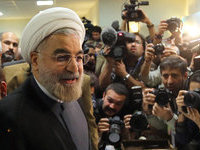Israel unimpressed with Iran recognizing Holocaust
Iranian President Hassan Rouhani called the Nazi crimes against the Jews, as well as any crime against humanity, "reprehensible and condemnable." His statement was served by the media as a sensation and the recognition of the Holocaust that the former president Ahmadinejad has called a "myth." However, Israel was not impressed.

Hassan Rouhani who is currently in New York with a visit to the UN General Assembly was asked what he thought about the statement of his predecessor that the Holocaust was a myth. "I'm not a historian, and when it comes to speaking about the dimensions of the holocaust, it's the historians who should reflect on it," he said in an interview to CNN.
"The taking of human life is contemptible. It makes no difference whether that life is Christian, Jewish or Muslim. For us it is the same," concluded Rouhani. His last words indicate that Rouhani spoke from the perspective of a religious man and a cleric, not a state leader. It is unlikely that the President has changed his point of view about the State of Israel over the last month. When speaking at a rally in Tehran dedicated to the Day of Palestine celebrated in a number of Muslim countries, he called the Jewish state a festering tumor on the body of the Islamic world that should be removed.
This is confirmed by the entry on Rouhani's Twitter account after the CNN interview that said the Holocaust did not mean that Israel could usurp and occupy lands.
Prime Minister of Israel Benjamin Netanyahu did not share the euphoria of the West about Rouhani's words that regarded them as a conciliatory move. Netanyahu said that the world should not be confused by Rouhani's statements. He called to continue to put pressure on Tehran that, according to Israel, is trying to build a nuclear bomb.
The convergence of the West and Iran causes fear in Israel, and rightly so. U.S. President Barack Obama said at a session of the Assembly on Tuesday that he asked Secretary John Kerry to explore the possibility of resuming contacts with Iran. It likely has to do with a possible softening of the international sanctions imposed on Iran in 2010 in response to the resumption of negotiations on Iran's nuclear program.
Netanyahu has not shown any signs of softening in his position after Rouhani's speech, wrote The Jerusalem Post. The paper quoted Netanyahu saying that it was precisely the strategy of Iran to speak and win time in order to move towards its goal of nuclear weapons development. Intelligence Minister Yuval Steinitz commented on the Israeli public radio that while Rouhani did not deny the Holocaust, he did not condemn those who denied it, i.e., his predecessor Ahmadinejad and other Iranian leaders.
From the Iranian perspective, the problem with Israel is not the recognition of the Holocaust (from the point of view of Israel, not only this). Minister of Foreign Affairs Mohammad Javad Zarif told Tasnim News Agency that they have never been against the Jews, but were against the Zionists. He added that they would not allow the Zionists to represent Iran as an anti-Semitic country in order to cover up their crimes against the Palestinian and Lebanese people. He continued that Iran has never denied the Holocaust. He later wrote on Twitter that there was no anyone in the Iranian politics who denied it.
Rouhani in his speech at the UN podium called on the international community to recognize the country's nuclear program as a natural, sovereign and inalienable right of Iran and deplored the violent sanctions and pressure on Iran. Under the Constitution the President is the second head of state after the spiritual leader, Ayatollah Seyed Ali Khamenei.
He said that the Supreme Leader of the Islamic Revolution recognized nuclear program as the country's natural, sovereign and inalienable right. This is not a political slogan and is based on a deep knowledge of nuclear technology and the international environment, as well as the need to find common goals and interests to achieve common understanding and common security.
This is a sufficient hint that Iran does not intend abandoning its nuclear program, and Rouhani's "moderation" is related to his spiritual rank. The Iranian American Jewish Federation that did not accept the invitation to meet with Rouhani during his current visit to New York understands it very well. Sam Kermanian, a special adviser to the Federation of Iranian Jews in America, explained that his organization after a consultation with the Jewish leaders of the United States has decided not to attend the meeting as it may send the wrong signal to the administration and the American public opinion during this difficult time."
Iran, mostly Tehran, is home to approximately 25,000 Jews who form the largest Jewish community in the Middle East outside Israel. In Majlis, the Jewish community has one seat, according to the Constitution of 1907 (Christians, for comparison, have three reserved seats).
Lyuba Lyulko
Subscribe to Pravda.Ru Telegram channel, Facebook, RSS!


